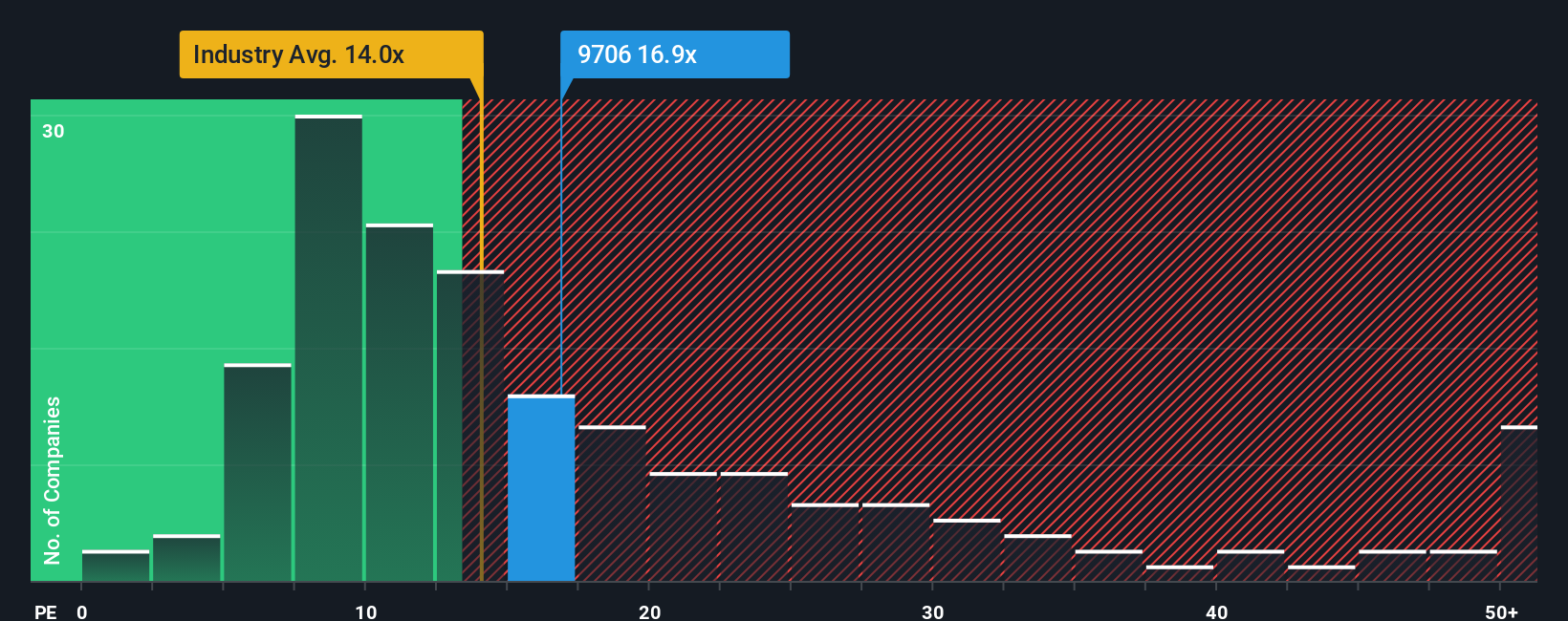When close to half the companies in Japan have price-to-earnings ratios (or “P/E’s”) below 14x, you may consider Japan Airport Terminal Co., Ltd. (TSE:9706) as a stock to potentially avoid with its 16.9x P/E ratio. However, the P/E might be high for a reason and it requires further investigation to determine if it’s justified.
This technology could replace computers: discover the 20 stocks are working to make quantum computing a reality.
Japan Airport Terminal certainly has been doing a good job lately as it’s been growing earnings more than most other companies. It seems that many are expecting the strong earnings performance to persist, which has raised the P/E. You’d really hope so, otherwise you’re paying a pretty hefty price for no particular reason.
Check out our latest analysis for Japan Airport Terminal
 TSE:9706 Price to Earnings Ratio vs Industry September 1st 2025 Keen to find out how analysts think Japan Airport Terminal’s future stacks up against the industry? In that case, our free report is a great place to start. Does Growth Match The High P/E?
TSE:9706 Price to Earnings Ratio vs Industry September 1st 2025 Keen to find out how analysts think Japan Airport Terminal’s future stacks up against the industry? In that case, our free report is a great place to start. Does Growth Match The High P/E?
Japan Airport Terminal’s P/E ratio would be typical for a company that’s expected to deliver solid growth, and importantly, perform better than the market.
Taking a look back first, we see that the company grew earnings per share by an impressive 27% last year. Although, its longer-term performance hasn’t been as strong with three-year EPS growth being relatively non-existent overall. So it appears to us that the company has had a mixed result in terms of growing earnings over that time.
Turning to the outlook, the next three years should bring diminished returns, with earnings decreasing 3.1% per annum as estimated by the eight analysts watching the company. With the market predicted to deliver 9.5% growth per annum, that’s a disappointing outcome.
With this information, we find it concerning that Japan Airport Terminal is trading at a P/E higher than the market. Apparently many investors in the company reject the analyst cohort’s pessimism and aren’t willing to let go of their stock at any price. Only the boldest would assume these prices are sustainable as these declining earnings are likely to weigh heavily on the share price eventually.
The Bottom Line On Japan Airport Terminal’s P/E
Generally, our preference is to limit the use of the price-to-earnings ratio to establishing what the market thinks about the overall health of a company.
We’ve established that Japan Airport Terminal currently trades on a much higher than expected P/E for a company whose earnings are forecast to decline. When we see a poor outlook with earnings heading backwards, we suspect the share price is at risk of declining, sending the high P/E lower. This places shareholders’ investments at significant risk and potential investors in danger of paying an excessive premium.
Before you settle on your opinion, we’ve discovered 3 warning signs for Japan Airport Terminal (1 doesn’t sit too well with us!) that you should be aware of.
It’s important to make sure you look for a great company, not just the first idea you come across. So take a peek at this free list of interesting companies with strong recent earnings growth (and a low P/E).
New: Manage All Your Stock Portfolios in One Place
We’ve created the ultimate portfolio companion for stock investors, and it’s free.
• Connect an unlimited number of Portfolios and see your total in one currency
• Be alerted to new Warning Signs or Risks via email or mobile
• Track the Fair Value of your stocks
Try a Demo Portfolio for Free
Have feedback on this article? Concerned about the content? Get in touch with us directly. Alternatively, email editorial-team (at) simplywallst.com.
This article by Simply Wall St is general in nature. We provide commentary based on historical data and analyst forecasts only using an unbiased methodology and our articles are not intended to be financial advice. It does not constitute a recommendation to buy or sell any stock, and does not take account of your objectives, or your financial situation. We aim to bring you long-term focused analysis driven by fundamental data. Note that our analysis may not factor in the latest price-sensitive company announcements or qualitative material. Simply Wall St has no position in any stocks mentioned.


AloJapan.com